In today’s competitive market, launching a successful product requires more than just a great idea — it demands a streamlined and collaborative approach from concept to completion. That’s where Product Lifecycle Management software comes in.
PLM software helps organizations manage every stage of a product’s lifecycle — from initial design and development to manufacturing, servicing, and disposal. Whether you’re a small business building physical goods or a global enterprise managing complex supply chains, PLM tools centralize product data, automate workflows, and boost cross-functional collaboration.
The PLM market is evolving rapidly, expected to grow from $28.1 billion in 2023 to $43.7 billion by 2028, driven by increased demand for smarter, faster, and more connected product development processes. In this guide, we’ll explore the top PLM software platforms in 2025, breaking down their features, benefits, pricing, and ideal use cases to help you choose the best tool for your business needs.
Key Benefits of Using PLM Software
- Better Collaboration: Keeps design, engineering, suppliers, and management on the same page with real-time updates.
- Faster Time-to-Market: Automates tasks and approvals, so new products launch quicker.
- Error Reduction: Monitors edits and modifications to prevent expensive errors and rework.
- Improved Compliance: Helps meet industry standards and regulations with clear records and audit trails.
- Cost Savings: Reduces manual work, errors, and delays — saving money throughout the product lifecycle.
How to Choose the Right PLM Software
- Check Integration: Make sure it connects easily with your existing CAD, ERP, or supply chain systems.
- Cloud or On-Premise: Decide if you want easy cloud access or need an on-site solution for tighter control
- Scalability: Pick a tool that can grow with your business and handle more users or data in the future.
- User-Friendly Interface: Look for a system your team can learn quickly and actually use every day.
- Support and Updates: Choose a vendor with good support, training, and regular feature improvements.
Top Product Lifecycle Management Software
1. Siemens Teamcenter
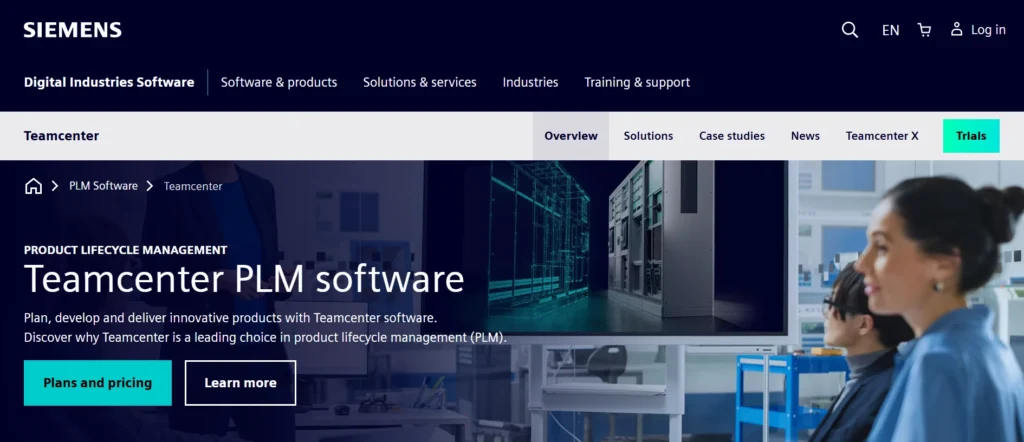
Website: https://plm.sw.siemens.com/en-US/teamcenter/
Siemens Teamcenter is also one of the most reliable and popular PLM solutions on the market, and the following companies have customers of Siemens Teamcenter-companies of all sizes, from those that are small to large enterprises. Teamcenter is built to cope with complicated product information and processes; the software can guide teams in everything, including early design ideas, manufacturing, and service.
It optimizes teamwork, ensures that all stakeholders are on the same page, and prevents expensive mistakes due to having one source of information about the product. The great merit of Teamcenter is that it has strong integration capabilities with most of the CAD tools and ERP solutions, and this configuration makes data flow across departments very smooth.
It synchronizes the entire product lifecycle with some of the most complex features, such as bill of materials (BOM) management, change control, and workflow automation. It has a simple interface and potent search tools, which enable the teams to access the appropriate information at an opportune time that promotes rapid and bold decision-making.
Top Features:
- Multi-CAD design management
- BOM management and configuration
- Workflow and process automation
- Requirements management
- Change and document management
Pricing:
- Available on request
2. PTC Windchill
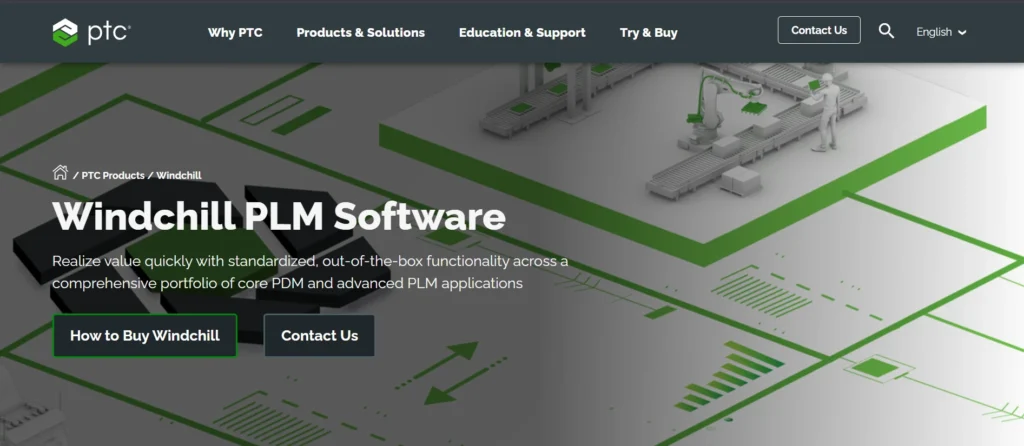
Website: https://www.ptc.com/en/products/windchill
PTC Windchill is a robust PLM system at the enterprise level, distinguished by its extensive capabilities and flexibility. Windchill is used in many global organizations to manage product data, collaboration, and enforce version control, in the context of distributed teams. It is particularly appreciated by the organizations in highly regulated sectors where more secure and well-controlled product design and modifications are required.
With Windchill acting as the hub of product data, all the parties (engineers and managers) are on the same page. The open architecture of Windchill allows one to seamlessly implement connections with CAD, ERP, and IoT systems, offering end-to-end traceability. As part of its core functionality, Windchill also serves as a robust Document Management Software, enabling secure storage, version control, and streamlined collaboration on all product-related documents.
Its advanced configuration capabilities and automation tools empower teams to manage complex product variations while complying with industry standards. Teams using Windchill can securely access real-time information, automate approvals and change processes, and accelerate time-to-market without compromising quality.
Top Features:
- Advanced version and revision control
- Secure collaboration and access control
- Product configuration and variant management
- Change and quality management
- Integration with CAD and IoT
Pricing:
- Available on request
3. Dassault Systèmes ENOVIA
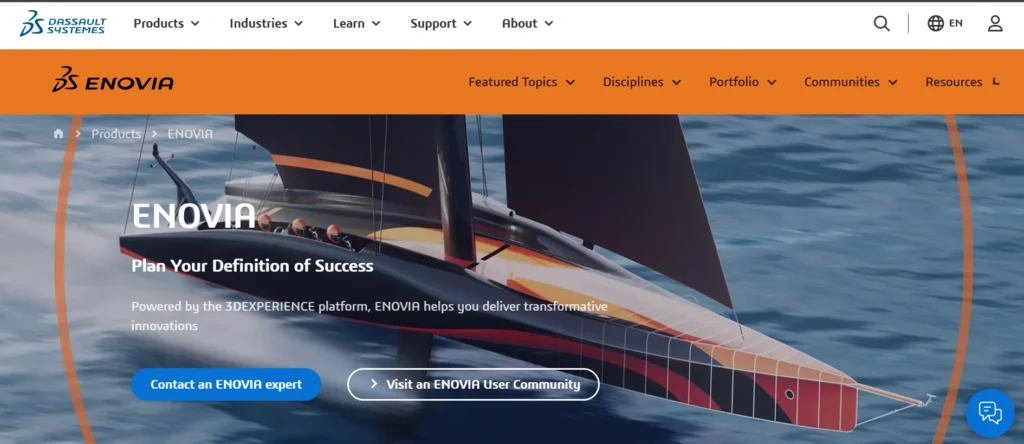
Website: https://www.3ds.com/products/enovia
ENOVIA by Dassault Systèmes is an all-purpose PLM solution that unites individuals, concepts, and information within a co-working environment. It facilitates multi-disciplinary product development, and this reduces its appeal to such industries as the aerospace industry, the automotive industry, and the electronics industry.
ENOVIA helps organizations to manage product structure, changes, and quality control, as well as cost-effective collaboration between the engineering, manufacturing, and supply chain departments. ENOVIA is a part of the powerful 3DEXPERIENCE platform produced by Dassault and unites the technologies of PLM, CAD, and simulation within one ecosystem.
Such integration guarantees that all the personnel of the team, including designers and project managers, operate on up-to-date data and can make decisions in real-time. ENOVIA can enable fast innovation cycles, lower costs, and limit design errors even in the most complex products, and features such as design data management, configuration control, secure access, etc.
Top Features:
- Collaborative innovation and project management
- Design data management and multi-CAD integration
- Change and configuration management
- Regulatory compliance and quality control
- Real-time dashboards and reporting
Pricing:
- Available on request
4. Autodesk Fusion Lifecycle
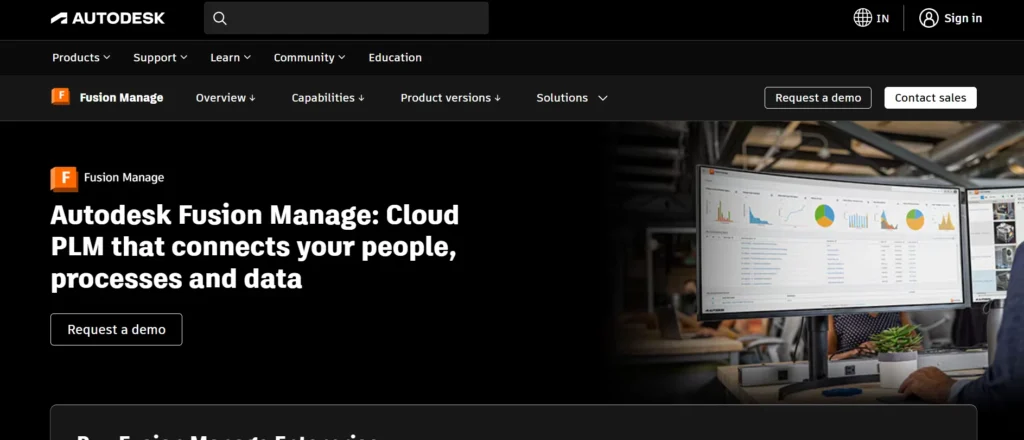
Website: https://www.autodesk.com/in/products/fusion-manage
Autodesk Fusion Lifecycle is a contemporary, cloud-based PLM system aimed at firms that do not wish to use on-premises servers and inflexible IT environments. It provides manufacturers of all scales with an effective mechanism of uniting teams, automating business processes, and product data management across all stages, including idea and production.
The flexible, user-friendly interface of Fusion Lifecycle enables the engineering, quality, and supply chain groups to collaborate without any issues. The main distinguishing feature of Fusion Lifecycle is its cloud-based architecture, whereby it gives stakeholders the opportunity to safely access product information whenever and wherever they are.
It streamlines functions such as BOMs management, engineering change orders, and communication with the suppliers through a single system, so there is no miscommunication and manual errors. Workflows can be readily customised to suit specific teams, and hence teams can implement products to the market with a faster pace and remain competitive.
Top Features:
- Cloud-based access with no local server requirements
- Flexible workflow and process automation
- BOM and change management
- Supplier collaboration
- Customizable dashboards and reports
Pricing:
- Available on request
Find More About: Cloud Management Platforms
5. Oracle Agile PLM
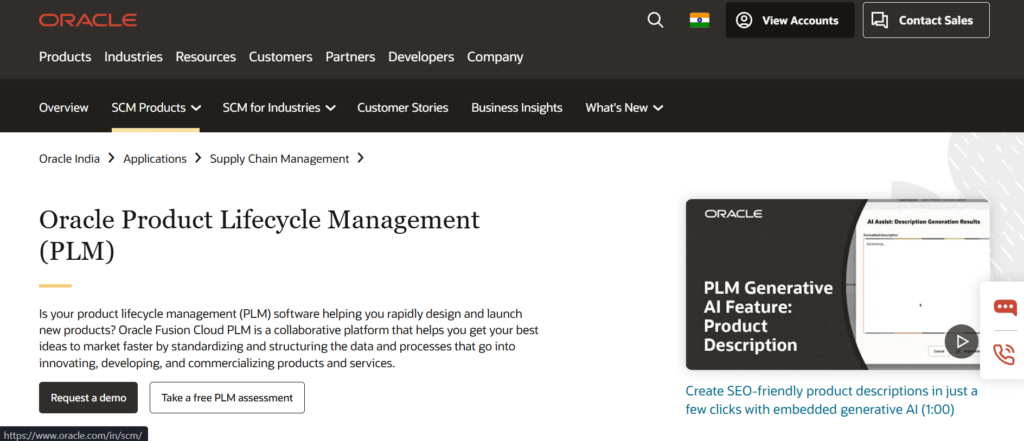
Website: https://www.oracle.com/in/scm/product-lifecycle-management/
Oracle Agile PLM represents an enterprise-level product lifecycle management system that is relied on by such world-renowned brands as Intel, Johnson & Johnson, and Procter and Gamble, who operate in such sectors of industry as electronics, life sciences, and consumer goods. It aids companies in handling the complex data regarding the product, steers cross-functional working, and adheres to the industry requirements.
Agile PLM collects each and every bit of product-related information, requirements to manufacture, and stores them in a single and secure location, making it easy to increase the quality of the product and minimize the launch cycle. With the ability to integrate with the robust and powerful enterprise cloud-based infrastructure of Oracle, Agile PLM will streamline the tasks of change orders, requests, voucher approvals, and quality controls, as well as provide secured role-based access to critical data and information.
It also integrates seamlessly with ERP and supply chain systems, even to the governance of real-time visibility, as well as all data consistency across the overall organization. This renders it a powerful option for businesses that have to cope with vast product portfolios and concentrate on the quality and management of products and regulatory specifications.
Top Features:
- Comprehensive product record management
- Quality and compliance management
- Portfolio and project management
- Workflow and process automation
- Secure, scalable architecture
Pricing:
- Available on request
6. Aras Innovator
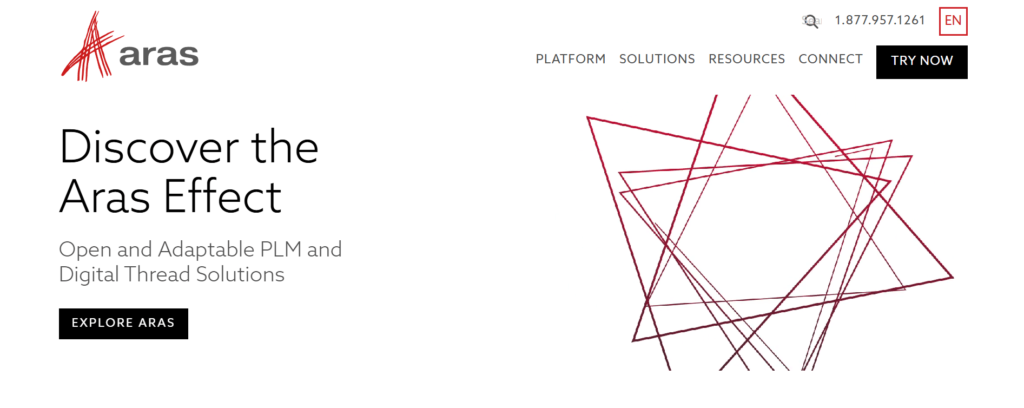
Website: https://aras.com/en
Aras Innovator stands out in the PLM market for its unique open and flexible architecture, which makes it highly adaptable to the specific needs of modern manufacturers. Unlike many traditional PLM solutions, Aras Innovator allows companies to customize and extend its capabilities without complex coding or costly upgrades.
It’s used by companies across industries such as aerospace, automotive, electronics, and industrial manufacturing to manage product development, changes, quality, and compliance on a global scale. One of Aras Innovator’s biggest strengths is its ability to connect siloed teams and legacy systems through its web-based platform.
Organizations can model their unique business processes and keep up with industry changes without being locked into rigid systems. With powerful features for configuration management, document control, and digital thread capabilities, Aras Innovator helps teams collaborate better, reduce risk, and maintain a complete history of product data throughout its lifecycle.
Top Features:
- Flexible, model-based architecture
- Change and configuration management
- Document management and version control
- Quality and compliance management
- Integration with ERP, CAD, and other enterprise systems
Pricing:
- Available on request
7. Arena PLM
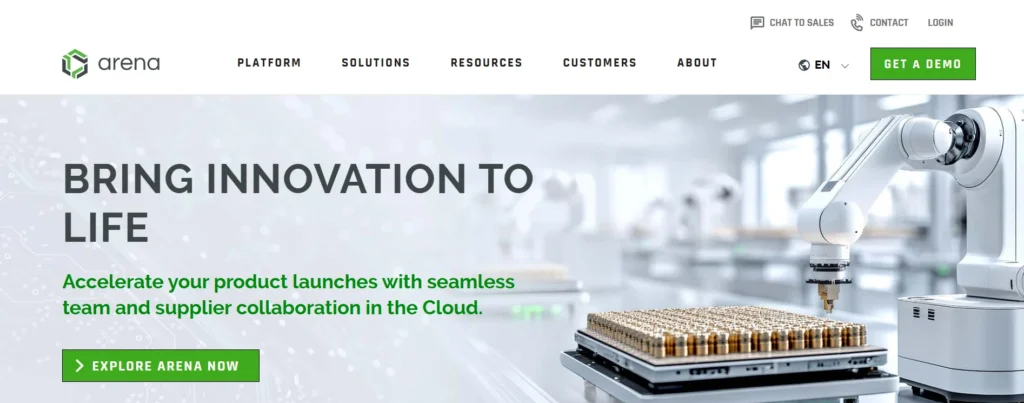
Website: https://www.arenasolutions.com/
Arena PLM by PTC is one of the best-selling cloud-native PLM and QMS (Quality Management System) systems, which are oriented toward high-tech electronics, medical devices, and other high-velocity industries. It is built to enable teams to get complex products to market much quicker, whilst maintaining strict adherence to the regulations of the industry.
With Arena PLM, a unified collaborative work space among engineering, manufacturing, and supply chain partners is seamlessly integrated in the space in an easy and ubiquitous way. Since it is cloud-built, Arena removes the expensive on-premise resources and offers rapid deployment and automatic updates. Arena supports full traceability as teams utilize it in the management of BOMs, engineering change orders (ECOs), and quality procedures.
It simplifies audits and regulatory submissions as well as enables companies to align their cross-functional teams and suppliers, eliminate production errors, and customize their workflows to meet production needs.
Top Features:
- Cloud-native PLM and QMS
- BOM and ECO management
- Quality process management
- Supplier collaboration
- Secure, scalable, and compliant platform
Pricing:
- Available on request
8. SAP PLM
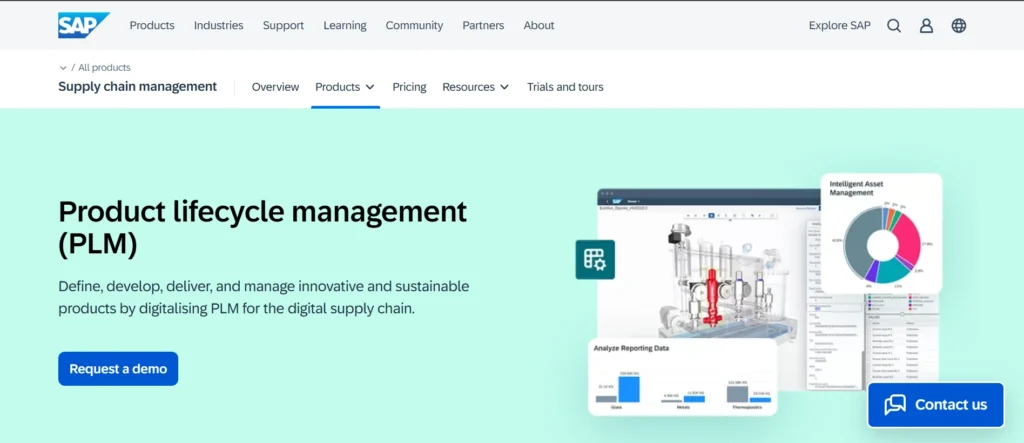
Website: https://www.sap.com/india/products/scm/plm-r-d-engineering.html
SAP PLM is a component of the broader enterprise software suite offered by SAP and is therefore a good fit with companies striving to have a closed loop between product development, manufacturing, supply chain, and business operating systems. SAP PLM is known to be a scalable solution and has great support in the industry, and it assists companies in managing the overall product lifecycle through innovation and design production to end-of-life. It is popular in such fields as automotive, consumer goods, and industrial machinery.
SAP PLM offers strong capabilities when it comes to the management of product structure, engineering changes, compliance, and sustainability. Since it is entrenched in the SAP ecosystem, it allows one to see costs, supply chain, and output plans in real-time, which makes it possible to make better decisions.
The companies are able to enjoy more transparency and control of the data on products as well as simplify the cooperation between the engineering, procurement as well and manufacturing teams.
Top Features:
- Integrated with SAP ERP and supply chain solutions
- BOM management and variant configuration
- Change and version control
- Compliance and sustainability management
- Advanced reporting and analytics
Pricing:
- Available on request
9. Infor PLM
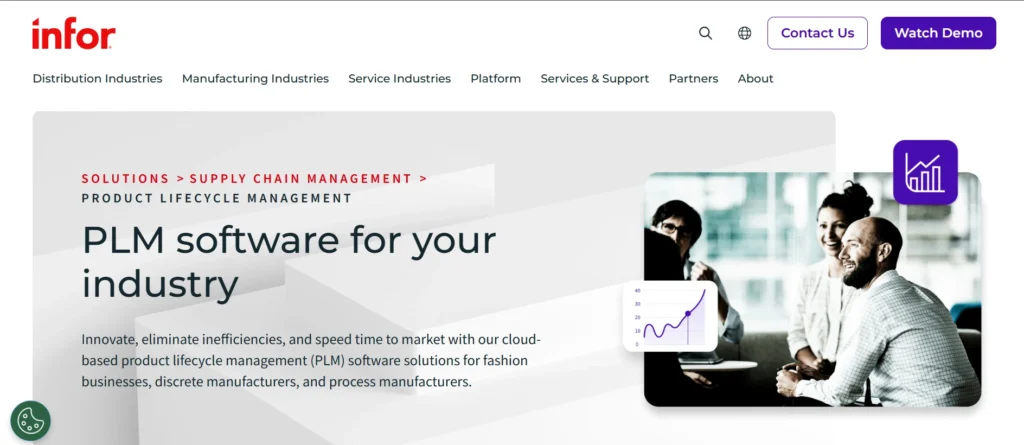
Website: https://www.infor.com/solutions/scm/plm
Infor PLM is an effective solution that can satisfy the demands of such industries as manufacturing, fashion, food and beverage, and industrial equipment. It helps businesses innovate their goods and create and launch them quickly and effectively. By integrating product data into other important business processes, including ERP, supply chain management, as well as customer relationship management, Infor PLM will enable many individuals to operate using a single source of truth.
One of the most valuable features of Infor PLM is its modern user experience and functionalities tailored to specific industries. It assists firms in managing products, product structures, revisions, specifications, and compliance issues efficiently. Integrated with Infor’s Supply Chain Management tools, it provides end-to-end visibility and coordination across design, production, and delivery.
The cloud-based deployment options empower businesses to scale globally, adapt to market fluctuations, and collaborate with suppliers and partners—all while maintaining strong data security and governance.
Top Features:
- End-to-end product lifecycle support
- BOM and specification management
- Regulatory compliance and sustainability
- Integration with Infor CloudSuite ERP
- Supplier collaboration and workflow automation
Pricing:
- Available on request
10. Autodesk Vault
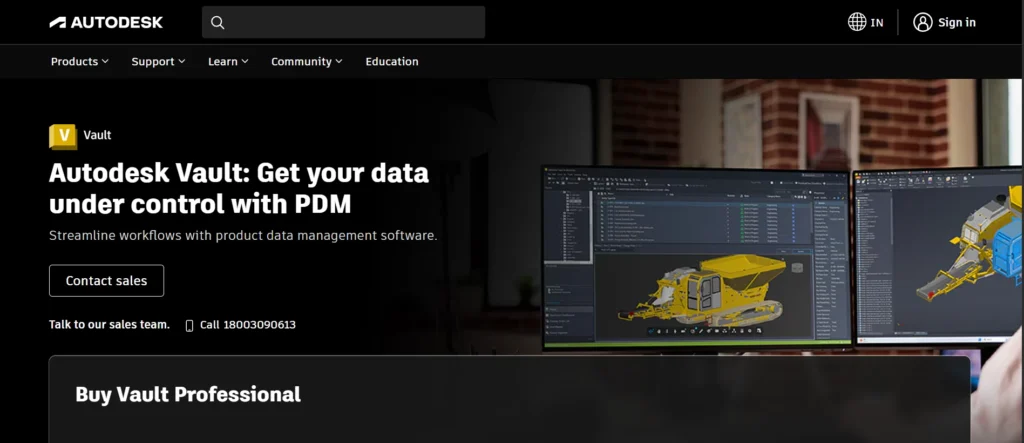
Website: https://www.autodesk.com/in/products/vault/overview
Autodesk Vault is a popular data management system aimed at supporting engineering and manufacturing groups in the organization, control, and maintenance of the product design data. Not being a full-featured PLM in its own right, Vault can be regarded as an effective PDM (Product Data Management) system, which is tightly interconnected with other popular Autodesk design applications, such as AutoCAD and Inventor.
Vault makes a good starting point for PLM due to several reasons: many companies use Vault to provide certainty that design information has been secured, placed under version control, and that the information is accessible. Vault enhances collaboration in that it enables the individuals who are assigned the same task to work with the most up-to-date design documents without overriding one another.
It checks in and checks out files, it tracks versions and change control functions, and more, all to eliminate errors and miscommunications within a team when handling complex design projects. Customers who have already established their own ecosystem with Autodesk tools may find it easy to migrate to a more comprehensive PLM with the help of Vault, Fusion Lifecycle, and other Autodesk products.
Top Features:
- Secure design data management
- Automated version control and revision tracking
- CAD integration with Autodesk products
- File check-in/check-out workflows
- Scalable deployment for growing teams
Pricing:
- Available on request
11. Centric PLM
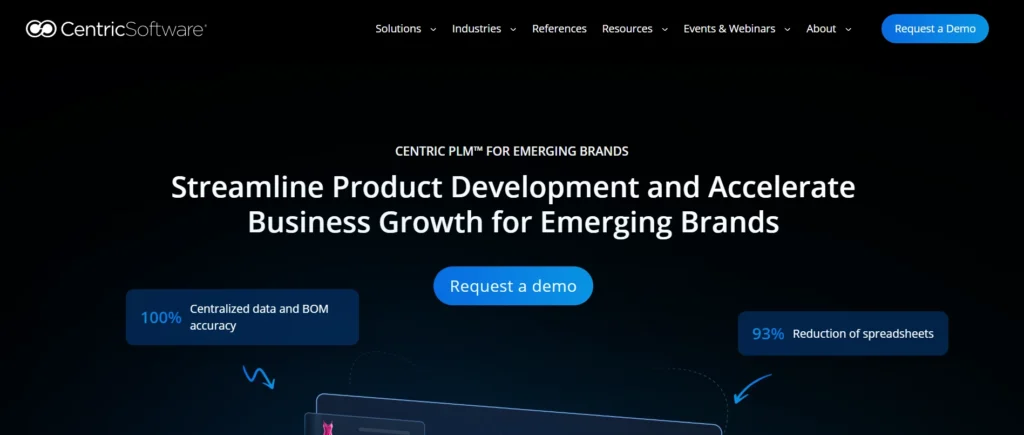
Website: https://www.centricsoftware.com/what-is-centric-plm/plm-for-emerging-brands/
Fashion, retail, consumer products, and food and beverage firms rely on Centric PLM, a well-known and specialized PLM system. Unlike traditional Product Lifecycle Management Software that mainly targets manufacturing and industrial sectors, Centric focuses on fast-moving industries where speed, trend changes, and supply chain agility are key.
Top apparel brands, luxury labels, and even food companies use Centric PLM to handle product design, development, sourcing, and launch — all in one place. Centric PLM makes it easy for design, product development, merchandising, and sourcing teams to work together in real time. It streamlines everything from initial sketches and samples to supplier quotes, packaging, and quality checks.
Its easy-to-use, mobile-friendly platform means teams can update product data, approve changes, and track progress anytime, anywhere — helping brands get the right products to market faster and stay ahead of trends.
Top Features:
- End-to-end product development for fashion & consumer goods
- Line planning, tech packs, and sampling tools
- Supplier collaboration and sourcing management
- Quality control and compliance tracking
- Mobile apps for remote teams
Pricing:
- Available on request
12. Propel PLM
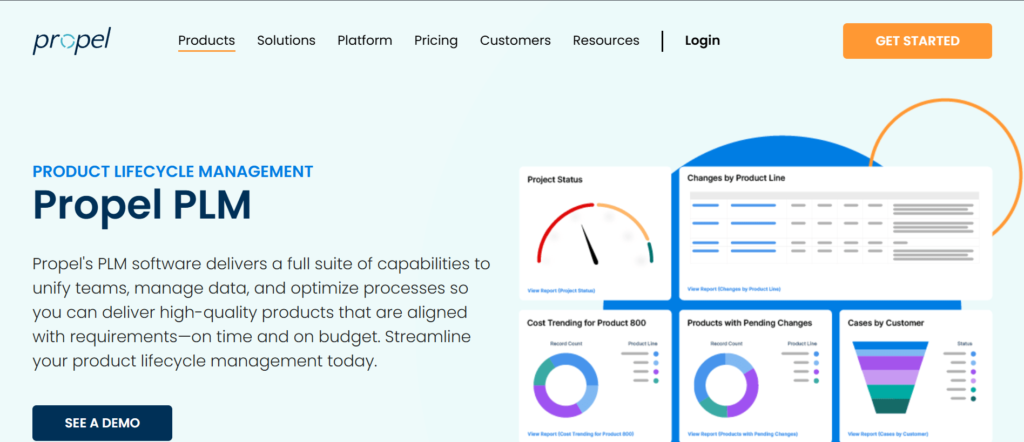
Website: https://www.propelsoftware.com/products/plm
A new cloud-based PLM that runs natively on the Salesforce platform is called Propel PLM. It places the companies with the benefit of being able to take care of the full product lifecycle, that is, to get the product into the customer environment in one connected ecosystem. Propel is geared towards high-tech, medical device, and consumer goods firms that require high-quality products of high quality launches in a short time, honed with tight regulations and quality demands.
Since Propel runs on Salesforce, it gives a connection between product data and customer and sales data, forming a real customer-centric PLM approach. Multiple departments and partners will have a higher level of collaboration due to the ability of teams to coordinate their work on BOMs, changes, quality processes, and customer feedback in a single hub.
Propel accelerates the innovation process as companies are enabled to develop better products and bring them to the market with its user-friendly and modern interface and cloud infrastructure that is safe.
Top Features:
- Native Salesforce integration
- Customer-centric product data management
- BOM and change management
- Quality and compliance workflows
- Secure cloud deployment
Pricing:
- Available on request
13. OpenBOM
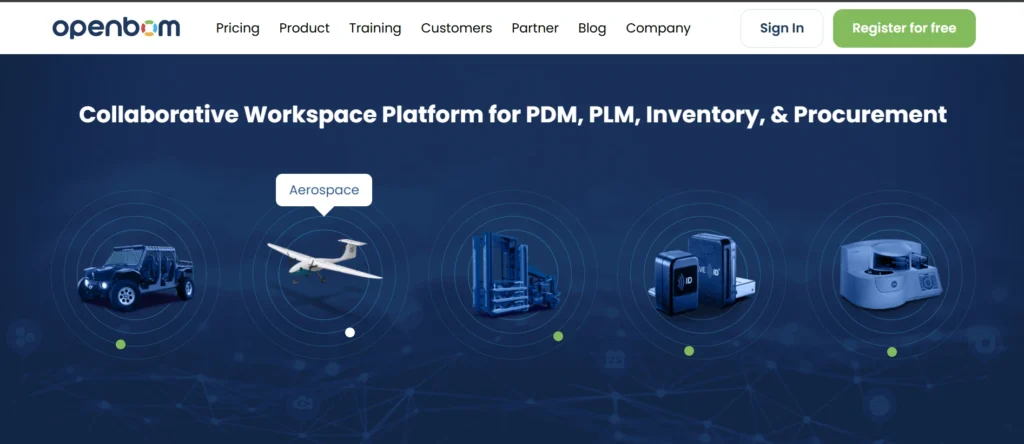
Website: https://www.openbom.com/
OpenBOM is easy to deploy and implement, a cloud-based BOM and Product Data Management software created to serve small to mid-sized manufacturers, hardware startups, and design consultancies. It allows teams to capture, structure, and communicate product structures and associated information through the design and manufacturing cycle.
The collaborative approach of OpenBOM gives real competitive opportunities to complex traditional Product Lifecycle Management Software when the team requires fast implementation and simple scale. OpenBOM can be hooked up to such well-known CAD systems so that users can create and refresh BOMs without any design files.
Its user-friendly interface is able to cope with real-time collaboration with suppliers and contractors, due to which there are few cases of miscommunication and errors in production. Using OpenBOM, there is no need to spend huge sums on servers or have IT departments, as the teams may easily work and manage revisions, comments, track changes, and make everyone aware of the latest product information.
Top Features:
- Cloud-based BOM management
- CAD integration with leading design tools
- Revision and change tracking
- Real-time supplier collaboration
- Easy setup with no local infrastructure needed
Pricing:
- Available on request
14. Synergis Adept
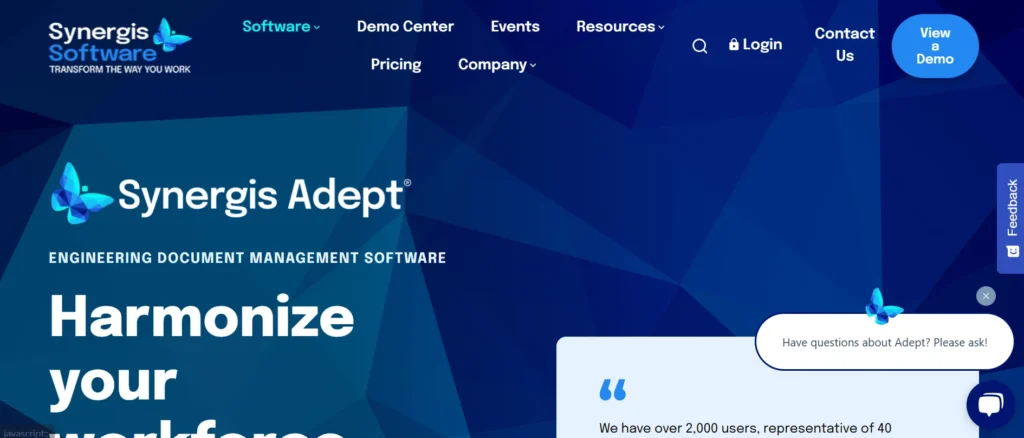
Website: https://www.synergissoftware.com/software/adept
Synergis Adept is a versatile document management and PDM solution that provides strong PLM-like capabilities for companies looking to organize, control, and share engineering data. Adept is trusted by manufacturers, utilities, and engineering firms who need tight control over complex product documents and drawings while ensuring secure collaboration with internal and external stakeholders.
Adept’s intuitive interface makes it easy for teams to find, check in/check out, and manage engineering files from CAD drawings to contracts and manuals. Its powerful version control, automated workflows, and audit trails help maintain compliance and reduce costly mistakes.
With integrations for popular CAD applications and ERP systems, Synergis Adept brings order to document chaos and lays a strong foundation for full-scale PLM initiatives.
Top Features:
- Document and CAD file management
- Automated workflows and approvals
- Version control and audit trails
- Secure collaboration and access controls
- Integration with CAD and ERP systems
Pricing:
- Available on request
Conclusion
In conclusion, choosing the right Product Lifecycle Management Software can make a big difference for any business that designs and builds products. The greatest tools make it easier for teams to communicate, stay organized, and launch products more quickly and accurately. A strong PLM solution saves time, reduces expenses, and keeps everyone in agreement, regardless of the size of your business. Your team (and your clients) would appreciate you taking the time to carefully consider the features and selecting the one that best suits your needs.
FAQs
Q. What exactly does PLM software do?
PLM software helps manage every step of a product’s life — from the first idea and design to manufacturing, service, and even retirement. It keeps all data, documents, and workflows organized in one place so teams can work together without confusion.
Q. Is PLM only for big companies?
No, even small and mid-sized businesses can benefit from PLM Software. Many modern options are cloud-based and flexible, so smaller teams can use them without big upfront costs.
Q. Can PLM software work with CAD and ERP systems?
Yes! Good PLM solutions usually connect well with CAD design tools and ERP systems. This means design data, bills of materials, and production plans all stay linked and updated automatically.

